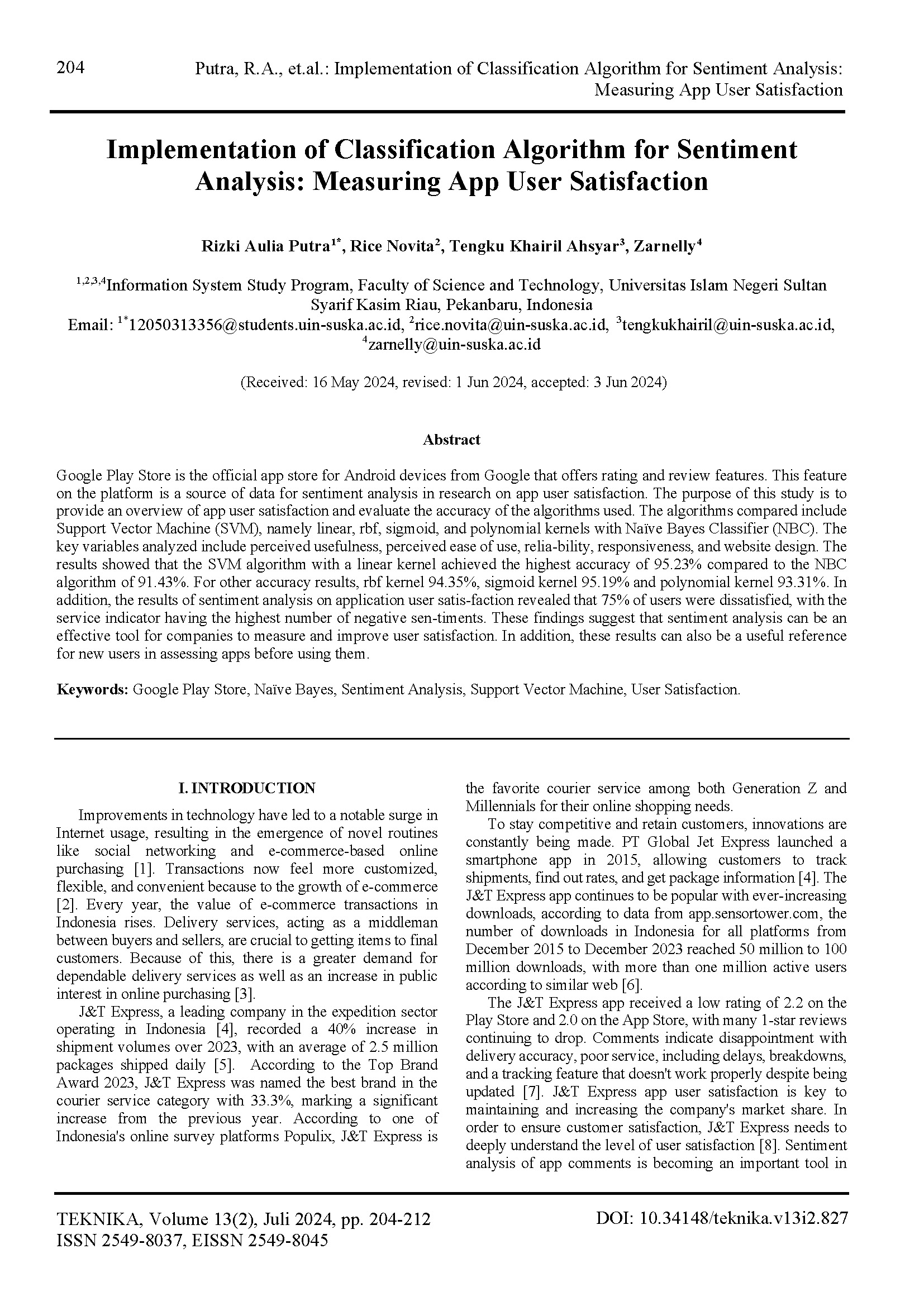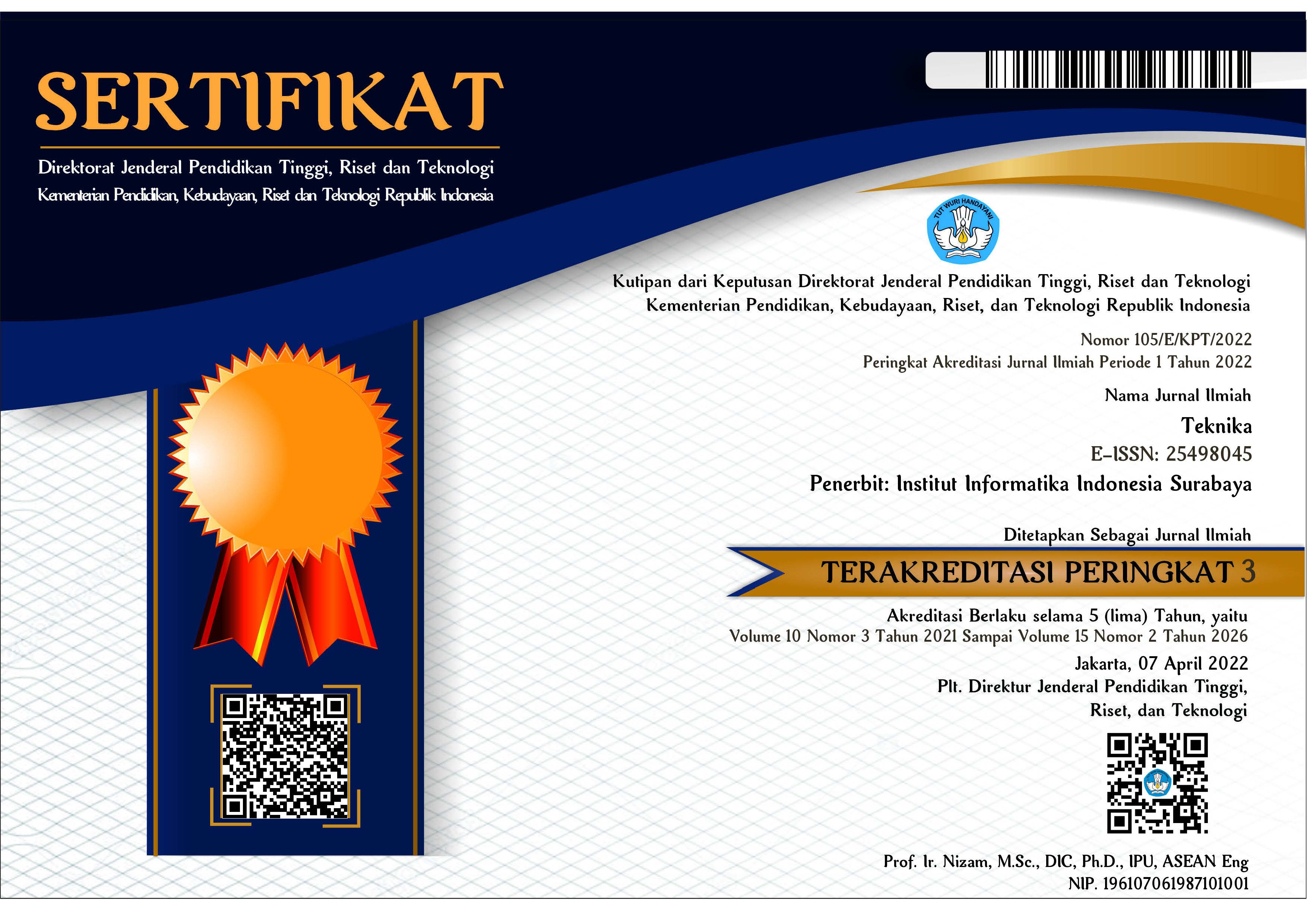Implementation of Classification Algorithm for Sentiment Analysis: Measuring App User Satisfaction
DOI:
https://doi.org/10.34148/teknika.v13i2.827Keywords:
Google Play Store, Naïve Bayes, Sentiment Analysis, Support Vector Machine, User SatisfactionAbstract
Google Play Store is the official app store for Android devices from Google that offers rating and review features. This feature on the platform is a source of data for sentiment analysis in research on app user satisfaction. The purpose of this study is to provide an overview of app user satisfaction and evaluate the accuracy of the algorithms used. The algorithms compared include Support Vector Machine (SVM), namely linear, rbf, sigmoid, and polynomial kernels with Naïve Bayes Classifier (NBC). The key variables analyzed include perceived usefulness, perceived ease of use, relia-bility, responsiveness, and website design. The results showed that the SVM algorithm with a linear kernel achieved the highest accuracy of 95.23% compared to the NBC algorithm of 91.43%. For other accuracy results, rbf kernel 94.35%, sigmoid kernel 95.19% and polynomial kernel 93.31%. In addition, the results of sentiment analysis on application user satis-faction revealed that 75% of users were dissatisfied, with the service indicator having the highest number of negative sen-timents. These findings suggest that sentiment analysis can be an effective tool for companies to measure and improve user satisfaction. In addition, these results can also be a useful reference for new users in assessing apps before using them.
Downloads
References
J. Khitamasari, I. F. Hanif, P. Studi, and T. Informatika, “Analisis Sentimen Ulasan User Terhadap Aplikasi Tix-Id Menggunakan Metode Naïve Baye s Pada Google Play Store,” vol. 23, no. 6, pp. 81–83, 2023.
F. Z. Shaumi and E. R. Cahyadi, “Perbandingan Kepuasan Pelanggan Terhadap Kualitas Layanan Logistik Pada JNE dan J&T Express di Jabodetabek,” J. Apl. Bisnis dan Manaj., vol. 8, no. 3, pp. 939–950, 2022, doi: 10.17358/jabm.8.3.939.
N. Aula, M. Ula, and L. Rosnita, “Analisis Sentimen Review Customer Terhadap Perusahaan Ekspedisi Jne, J&T Express Dan Pos Indonesia Menggunakan Metode Support Vector Machine (Svm) Analysis of Customer Review Sentiment To Jne, J&T Express and Pos Indonesia Expedition Companies Using Svm M,” J. Informatics Comput. Sci., vol. 9, no. 1, pp. 81–86, 2023.
A. Nurjanah, N. Aulia, E. R. Rasywir, and A. Feranika, “Analisis Tingkat Kepuasan Konsumen Terhadap Layanan Ekspedisi J&T Express Dengan Metode Algoritma Naive Bayes,” J. Manaj. Teknol. Dan Sist. Inf., vol. 2, no. 1, pp. 78–88, 2022, doi: 10.33998/jms.2022.2.1.39.
V. Elvira and H. K. Dewi, “No Title,” Kontan.co.id, 2023. https://industri.kontan.co.id/news/volume-pengiriman-jt-express-tumbuh-40-sepanjang-2022
M. A. Syainal et al., “Analisis User Experience Pada Aplikasi J & T EXPRESS Menggunakan Metode Heart Matrics .,” J. Ilm. Tek. Inform. dan Sist. Inf., vol. Vol. 12, no. 01, pp. 367–375, 2023.
O. D. Mawarni and S. W. Adi, “Pengaruh Fasilitas Sistem Pelacakan Online, Ketepatan Waktu Pengiriman, Harga Dan Kualitas Pelayanan Terhadap Kepuasan Pelanggan J&T Express (Studi Pada J&T Express Cabang Kota Karanganyar),” Eqien - J. Ekon. dan Bisnis, vol. 10, no. 1, pp. 445–450, 2022, [Online]. Available: https://stiemuttaqien.ac.id/ojs/index.php/OJS/article/view/556/372
E. Suryati, Styawati, and A. A. Aldino, “Analisis Sentimen Transportasi Online Menggunakan Ekstraksi Fitur Model Word2vec Text Embedding Dan Algoritma Support Vector Machine ( SVM ),” vol. 4, no. 1, pp. 96–106, 2023.
P. Arsi, R. Wahyudi, and R. Waluyo, “Optimasi SVM Berbasis PSO pada Analisis Sentimen Wacana Pindah Ibu Kota Indonesia,” J. RESTI (Rekayasa Sist. dan Teknol. Informasi), vol. 5, no. 2, pp. 231–237, 2021, doi: 10.29207/resti.v5i2.2698.
M. Rodríguez-Ibánez, A. Casánez-Ventura, F. Castejón-Mateos, and P.-M. Cuenca-Jiménez, “A review on sentiment analysis from social media platforms,” Expert Syst. Appl., vol. 223, no. March, p. 119862, 2023, doi: 10.1016/j.eswa.2023.119862.
A. B. Elciano, D. R. Atmaja, R. Rojuaniah, I. L. H. Hafidz, and F. Trianda, “Pengaruh Faktor Kualitas Layanan Aplikasi J&T Express terhadap Kepuasan Pelanggan, Niat Beli, dan Pembelian Aktual,” J. Inform. Ekon. Bisnis, vol. 5, no. No. 3, pp. 844–851, 2023, doi: https://doi.org/10.37034/infeb.v5i4.673.
U. Rastryana, U. Masahere, and S. Rusmayanti, “Analisis Ipa Dan Csi Terhadap Kepuasan Pelanggan Market Place Pada Pelayanan J&T Express Indonesia,” Akrab Juara J. Ilmu-ilmu Sos., vol. 7, no. 2, p. 41, 2022, doi: 10.58487/akrabjuara.v7i2.1814.
U. Amelia et al., “IMPLEMENTASI ALGORITMA SUPPORT VECTOR MACHINE ( SVM ) UNTUK PREDIKSI PENYAKIT STROKE DENGAN ATRIBUT BERPENGARUH,” vol. III, pp. 254–259, 2022.
P. Aditiya, U. Enri, and I. Maulana, “Analisis Sentimen Ulasan Pengguna Aplikasi Myim3 Pada Situs Google Play Menggunakan Support Vector Machine,” vol. 9, no. 4, pp. 1020–1028, 2022, doi: 10.30865/jurikom.v9i4.4673.
R. N. Sari and R. S. Hayati, “Penerapan Metode Multi Attribute Utility Theory (MAUT) Dalam Pemilihan Rumah Kost,” J-SAKTI (Jurnal Sains Komput. dan Inform., vol. 3, no. 2, p. 243, 2019, doi: 10.30645/j-sakti.v3i2.144.
T. Astuti and Y. Astuti, “Analisis Sentimen Review Produk Skincare Dengan Naïve Bayes Classifier Berbasis Particle Swarm Optimization ( PSO ),” vol. 6, pp. 1806–1815, 2022, doi: 10.30865/mib.v6i4.4119.
A. Novantika and Sugiman, “Analisis Sentimen Ulasan Pengguna Aplikasi Video Conference Google Meet menggunakan Metode SVM dan Logistic Regression,” Prism. Pros. Semin. Nas. Mat., vol. 5, pp. 808–813, 2022, [Online]. Available: https://journal.unnes.ac.id/sju/index.php/prisma/
D. Era, S. Andryana, and A. Rubhasy, “Perbandingan Algoritma Naïve Bayes Dan K-Nearest Neighbor pada Analisis Sentimen Pembukaan Pariwisata Di Masa Pandemi Covid 19,” J. Sains Komput. Inform. (J-SAKTI, vol. 7, no. 1, pp. 263–272, 2023.
M. Raffi, A. Suharso, I. Maulana, and U. S. Karawang, “Analisis sentimen ulasan aplikasi binar pada google play store menggunakan algoritma naïve bayes sentiment analysis of binar application reviews on google play store using naïve bayes algorithm,” vol. 6, 2023.
R. Adityawan, A. Gunawan, and G. L. Ginting, “Analisis Kepuasan Penggunaan Aplikasi Pospay Menerapkan Metode TAM,” vol. 1, no. 2, pp. 57–62, 2023.
N. Charoonsri et al., “Analisis Kepuasan Pelanggan Terhadap Pelayanan J & T Express Saribudolok Dengan Metode Servqual,” vol. 26, no. 1, pp. 44–49, 2024.
A. I. Tanggraeni and M. N. N. Sitokdana, “Analisis Sentimen Aplikasi E-Government Pada Google Play Menggunakan Algoritma Naïve Bayes,” vol. 9, no. 2, pp. 785–795, 2022.
F. Z. Tala, “A Study of Stemming Effects on Information Retrieval in Bahasa Indonesia,” 2003.
R. Sholihah and A. D. Indriyanti, “Analisis Kepuasan Pengguna Aplikasi Camscanner Menggunakan Metode Technology Acceptance Model ( TAM ) dan End-User Computing Satisfaction ( EUCS ),” vol. 03, no. 03, pp. 102–109, 2022.
P. Hadroh, M. Maheis, and I. Farida, “Jurnal Mirai Management Pengaruh Technology Acceptance Model (TAM) dan Kualitas Layanan Terhadap Minat Menggunakan Aplikasi Flip di Jawa Tengah,” J. Mirai Manag., vol. 8, no. 2, pp. 408–421, 2023, [Online]. Available: https://databoks.katadata.co.id/
A. Rianti, N. Wachid, A. Majid, and A. Fauzi, “Machine Learning Journal Article Recommendation System using Content based Filtering,” JUTI J. Ilm. Teknol. Inf., vol. 22, no. 1, pp. 1–10, 2024.
R. Maulana, A. Voutama, and T. Ridwan, “Analisis Sentimen Ulasan Aplikasi MyPertamina pada Google Play Store menggunakan Algoritma NBC,” J. Teknol. Terpadu, vol. 9, no. 1, pp. 42–48, 2023, doi: 10.54914/jtt.v9i1.609.























